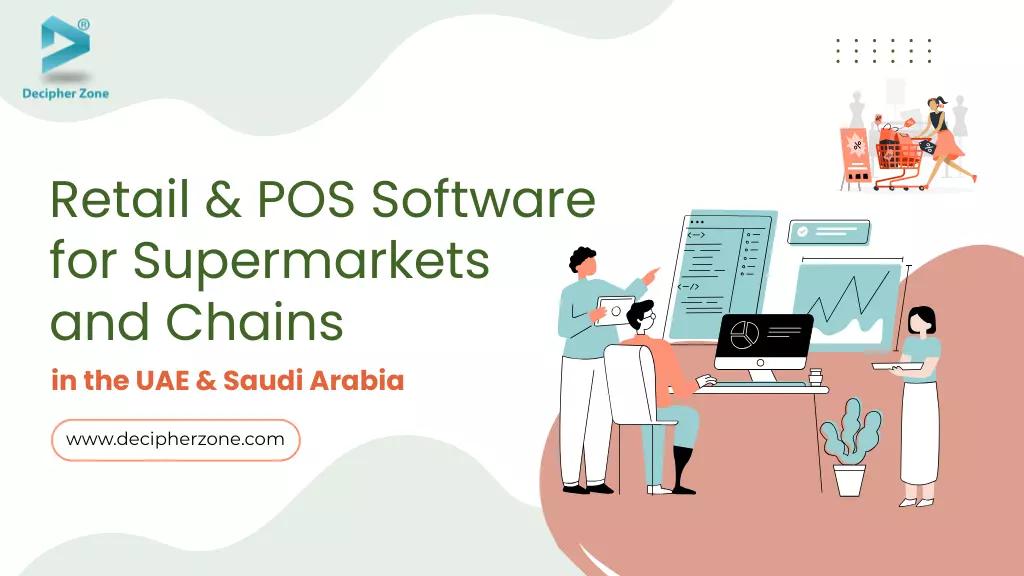Quick summary: Transform your traditional retail store into a modern store. Custom POS software solutions can streamline operations, improve inventory management, enhance customer service and gain real-time business insights. This article covers all the aspects of retail and point-of-sale (POS) software, from advantages, features, security measures, types to customization and localization strategies.
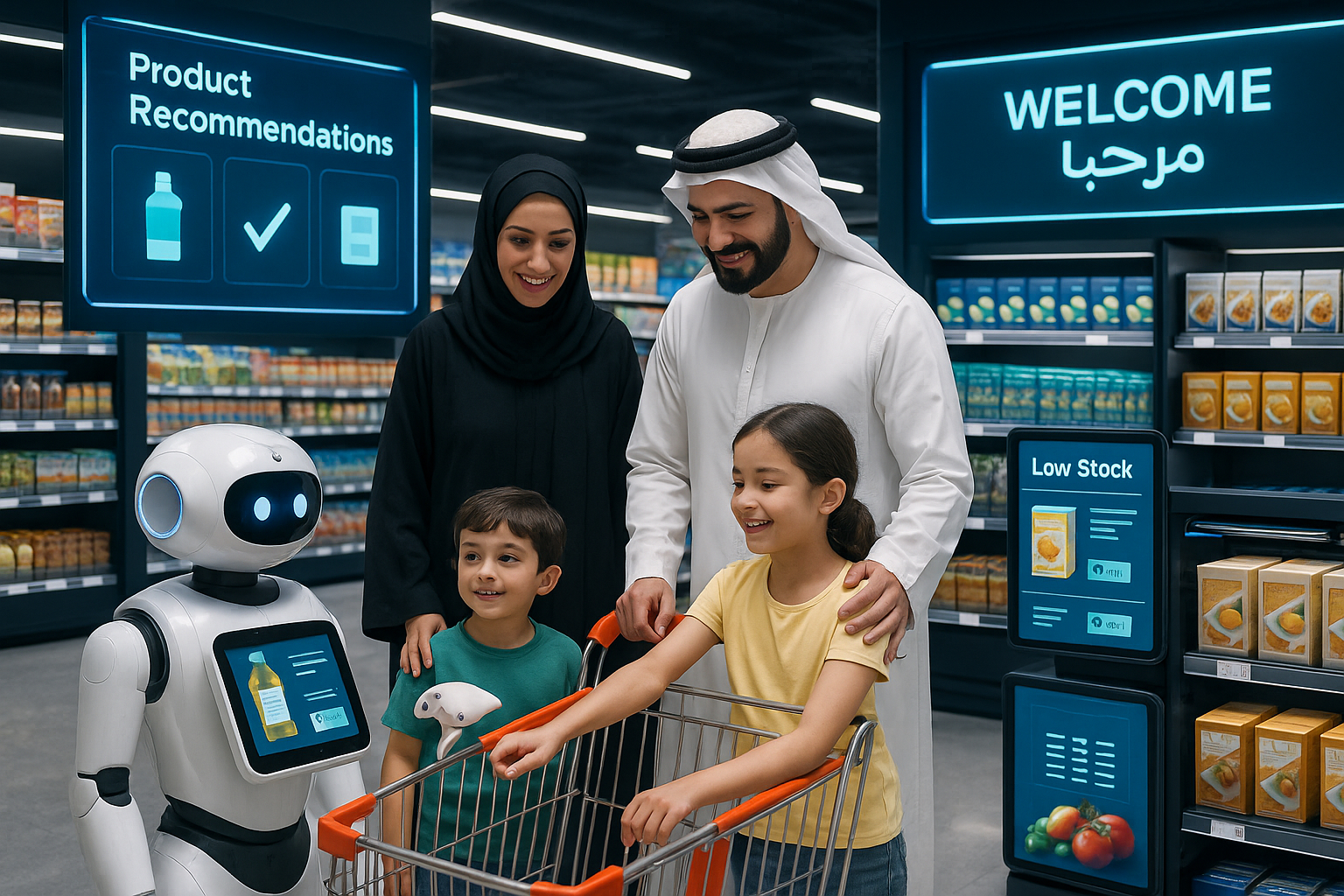
Supermarkets and retail chains are no longer just places of what they used to be. Especially in the MENA region these supermarkets and retail chains are becoming hubs of providing personalized shopping experiences, operational efficiency and data-driven decision-making. To meet these expectations, retailers are transforming into modern Retail and Point-of-Sale (POS) software.
POS software is not just about managing transactions but a full circle strategy for increasing retention, increasing revenue and providing better customer experiences than ever. Custom POS software solutions can streamline operations, improve inventory management, enhance customer service and gain real-time business insights. It is ideal for those who are managing single supermarkets or a chain of hypermarkets, significantly impacting the bottom line and scalability.
This blog explores all the aspects of retail and POS software tailored for supermarkets and chains specifically in the UAE and Saudi Arabia.
Read: Restaurant POS System
Understanding POS Software
Point-of-Sale (POS) is a centralized platform that connects every aspect of a retail business to conduct sales and manage retail operations at the checkout counter. It allows businesses to process transactions, issue receipts, track inventory, manage customer data and generate valuable real-time reports.
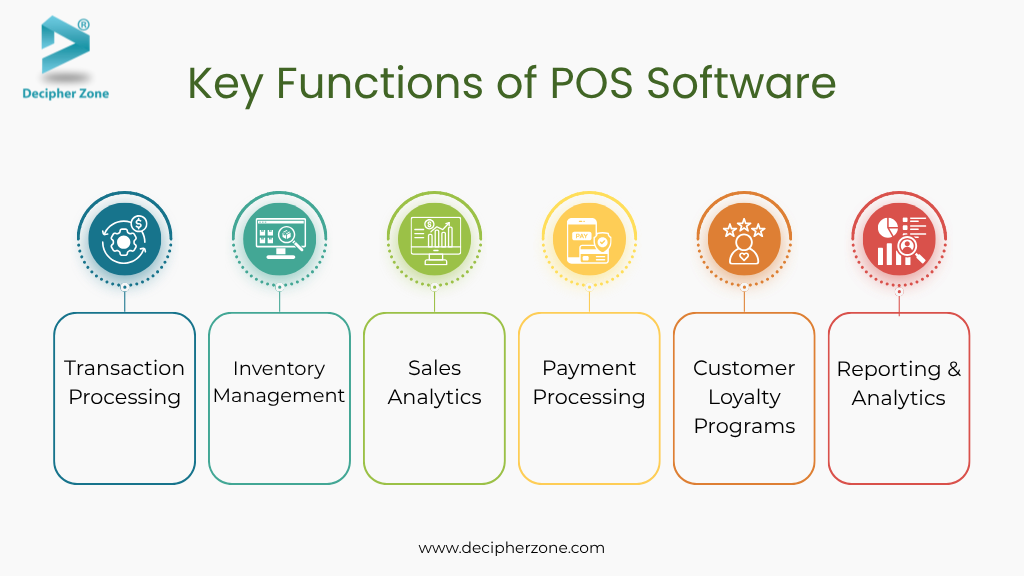
-
Transaction Processing: Handles all the aspects of the sale including scanning items, accepting payments and printing receipts.
-
Inventory Management: When items are running low it can track stock levels, alerts and can even integrate with other systems for automated ordering.
-
Sales Analytics: Generates insightful reports into sales trends, popular products and peak transaction periods.
-
Payment Processing: Support a wide range of payment methods such as cash, credit cards, debit cards and mobile payments.
-
Customer Loyalty Programs: Offers features to management and rewards loyal customers to encourage them to visit again.
-
Reporting & Analytics: Providing data-driven insights into sales performance, customer behavior and other key metrics.
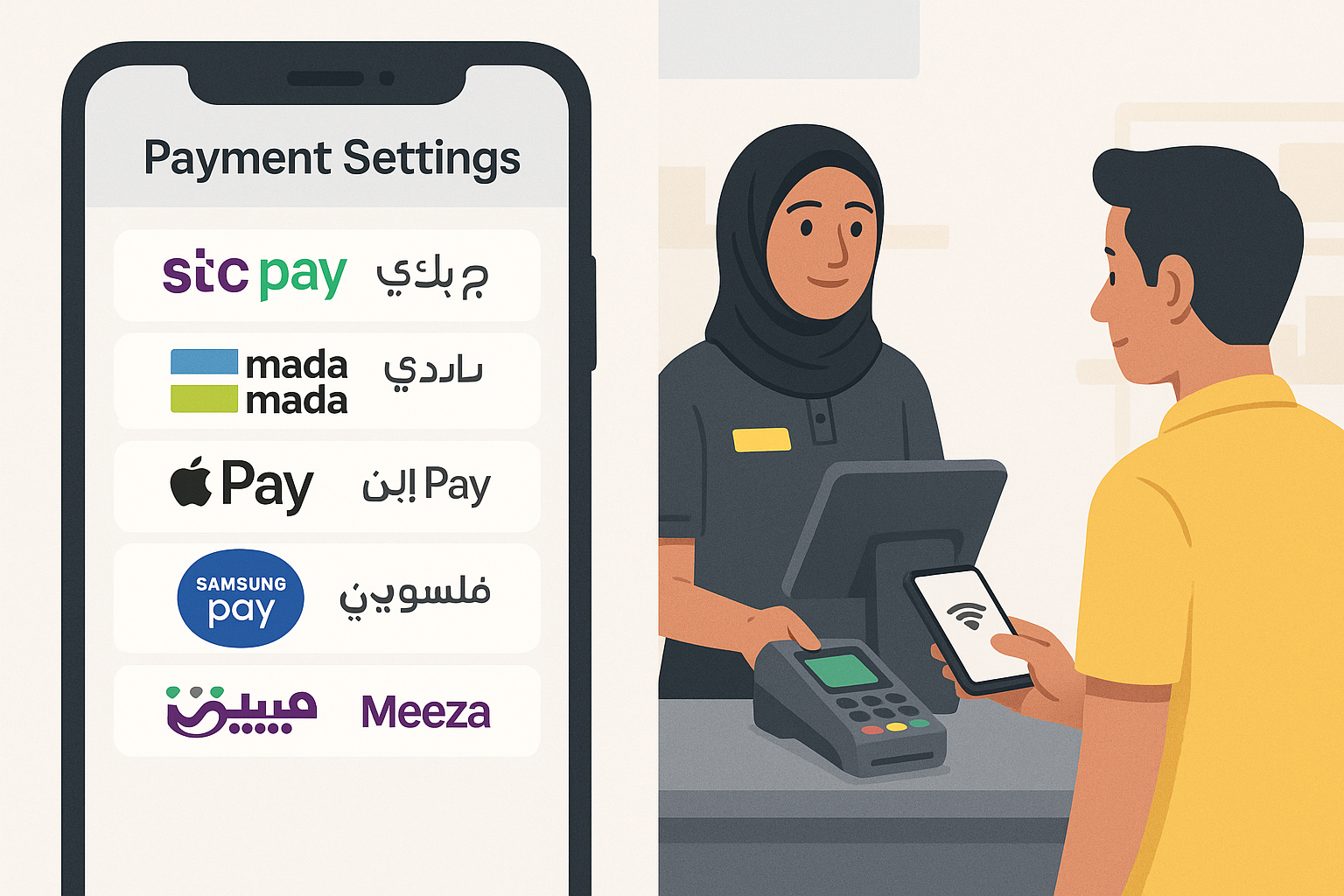
Unique Needs in the UAE & Saudi Retail Market
POS software needs to be highly adaptable, smoothly supporting multiple payment methods including digital wallets and QR codes. It should be compliant with local regulations including VAT reporting, robust inventory management, facilitate data-driven decision making through insightful analytics, and offer customer relationship management (CRM) features to build loyalty.
Here are some of the specific needs for POS software must-have in the MENA region:
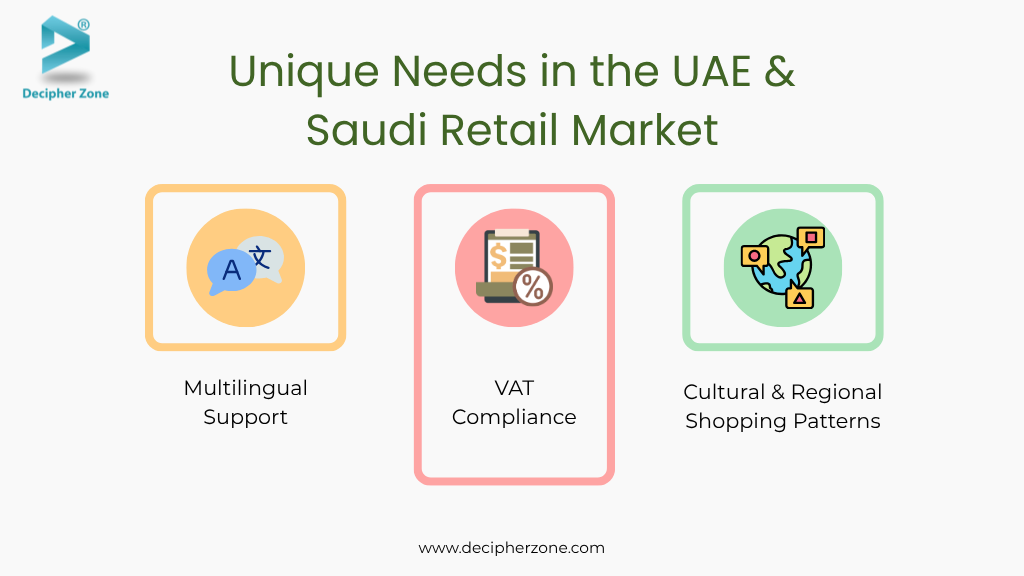
-
Multilingual Support: Offers clear communication with customers and staff in various languages especially in Arabic and English.
-
VAT Compliance: Generates VAT invoices automatically which leads to reducing the risk of errors and saves time. This ensures businesses meet all regulatory requirements.
- Cultural & Regional Shopping Patterns: Facilitates appropriate adjustments to staffing and inventory management, accommodates potential changes in shopping hours during Ramadan and considers local customs and preferences when designing user interfaces.
Benefits of Retail & POS Software for Supermarkets
Retail and POS software for supermarkets offers several advantages to increase efficiency, boost sales and build customer loyalty. Here are some:
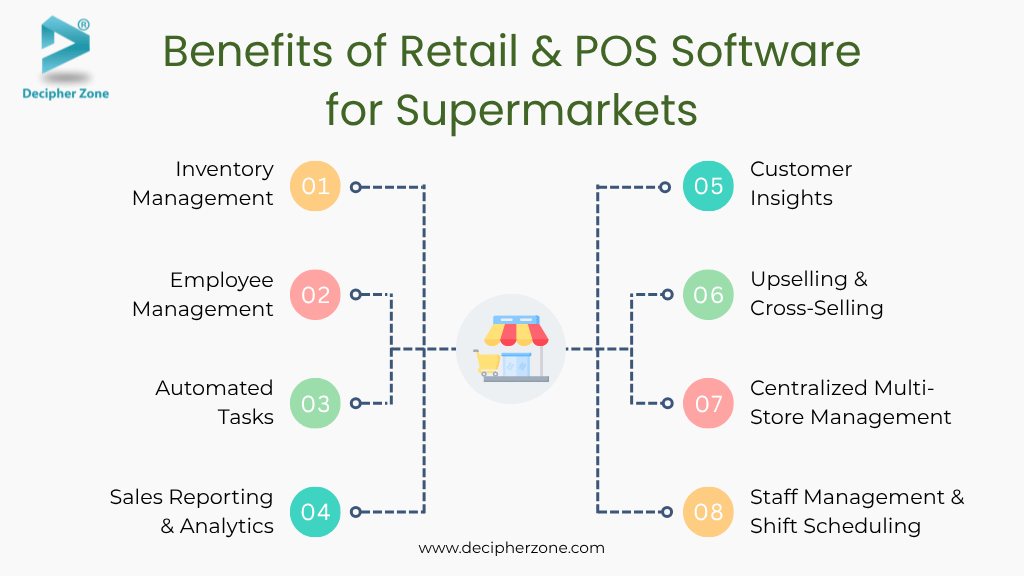
-
Inventory Management: Tracking inventory in real-time and alerts to minimize stockouts and overstocking to optimize inventory levels.
-
Employee Management: Helps with scheduling, payroll and performance tracking.
-
Automated Tasks: Automating chores like pricing changes, calculations and reporting, saving time and reducing errors.
-
Sales Reporting & Analytics: Provides detailed sales insights allowing businesses to track trends, identify opportunities like best-selling products and make well-informed decisions about pricing and promotions.
-
Customer Insights: Businesses can understand customer behavior, personalize offers and build loyalty with customer data capture through POS software.
-
Upselling & Cross-Selling: Facilitates upselling and cross-selling by suggesting related products or additional items based on customer purchases.
-
Centralized Multi-Store Management: Allows for overseeing multiple branches from a single dashboard, accessing all relevant data without the need for multiple spreadsheets, simplifying management.
-
Staff Management & Shift Scheduling: Easily track working hours, assign specific roles and monitor employee performance all in one place, enhancing the overall productivity.
Read: Food and Beverage Software Development
Upgrade Your Supermarket with Smart POS Solutions — Book a Free Demo Today
Core Features of a Robust POS Software
Robust POS software offers a user friendly interface, efficient inventory management and flexible payment options. Here are the core features that need to be considered while developing retail and POS software:
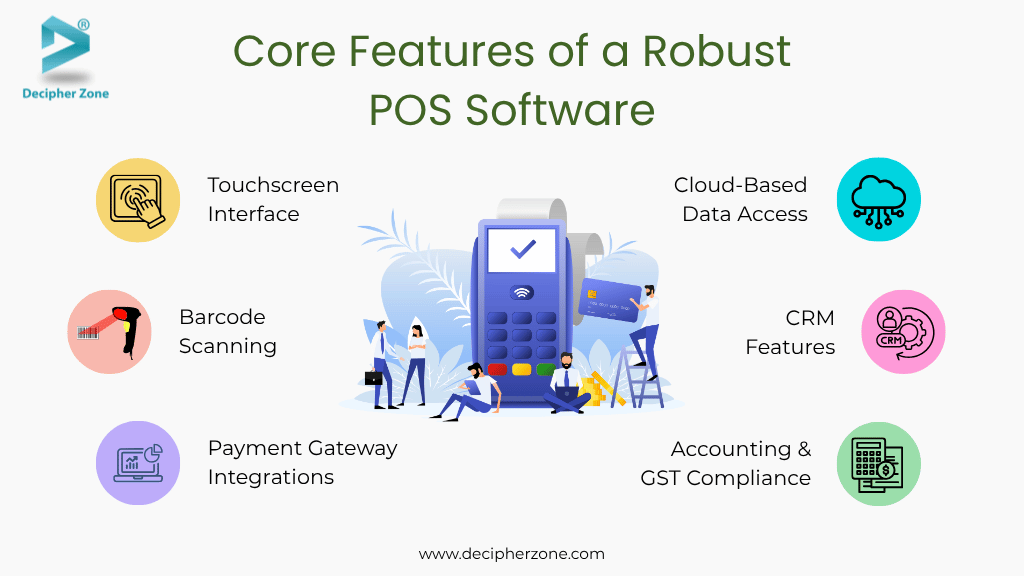
-
Touchscreen Interface: User-friendly touchscreen interfaces are designed to ease of use for both cashiers and customers leading to faster transaction times and overall customer experience.
-
Barcode Scanning: Helps reduce errors in scanning and accurately reflects the items purchased, ultimately speeding up the billing process.
-
Payment Gateway Integrations: Allows to accept multiple modes of payment including cash, credit/ debit cards, UPI, QR scanner and mobile wallets.
-
Cloud-Based Data Access: Enabling businesses to access and manage data from any location with internet access with real time data processing for well-informed decision making, offering flexibility and scalability.
-
CRM Features: Allows businesses to store customer information, track purchasing history and manage loyalty programs, boosting stronger customer relationships.
-
Accounting & GST Compliance: Generates invoices, tracks transactions and complies with tax regulations, leading to maintaining accurate financial records and meeting legal obligations.
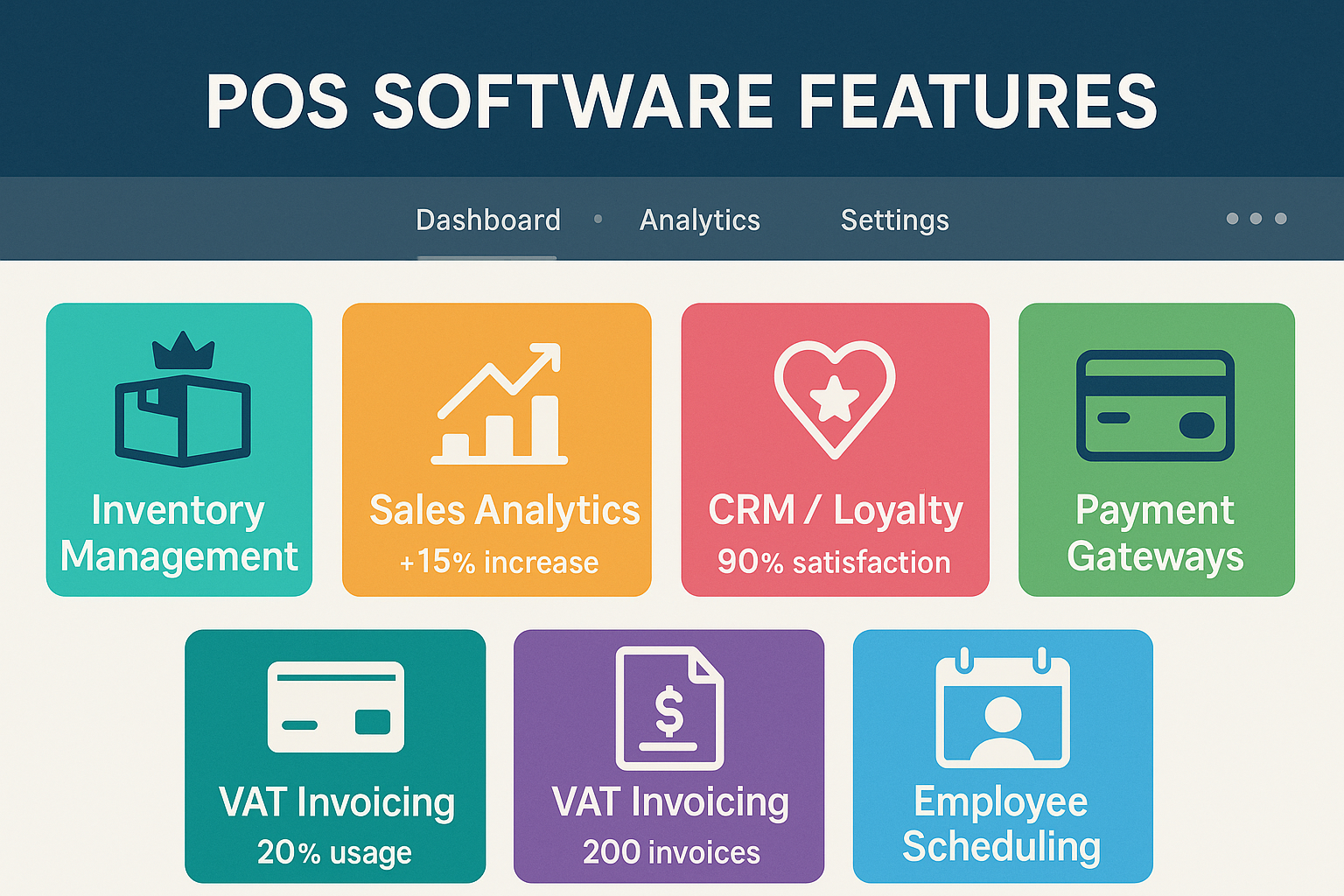
Types of Retail & POS Software
There are major types of Retail & POS software including desktop, mobile, tablet, cloud-based, self service kiosks, omnichannel and multi-channel POS systems. Each of these offers different functionality and benefits for businesses. Let’s discuss this further:
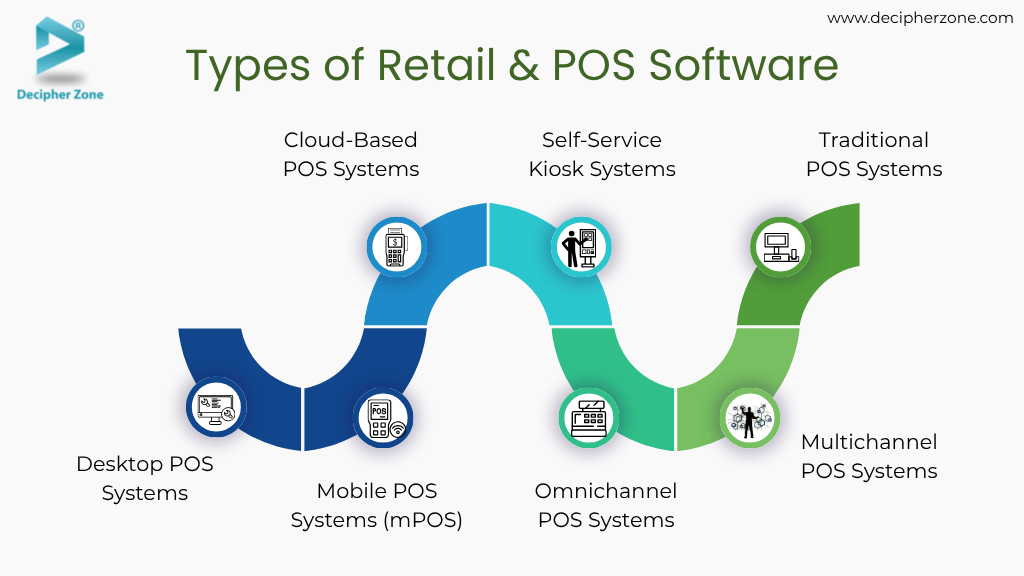
Desktop POS Systems
A computerized cash register that combines specialized software with traditional hardware like a monitor, keyboard, mouse and a barcode scanner and receipt printer. These systems offer comprehensive transactions, managing inventory and tracking sales in a retail setting.
Mobile POS Systems (mPOS)
A portable, wireless device allowing businesses to process payments and manage sales using a smartphone or tablet. These systems convert mobile devices into POS terminals, ideal for mobile vendors or businesses needing on the go transactions, offering flexibility, convenience and cost effectiveness.
Looking to Scale Your Retail Chain in the GCC? Get a Custom POS Quote Now
Cloud-Based POS Systems
A type of system that operates through the internet, storing data applications on external servers (the cloud) which is accessible from any device with an internet connection. These systems are flexible and scalable allowing businesses to access their POS data from multiple locations or remote access needs.
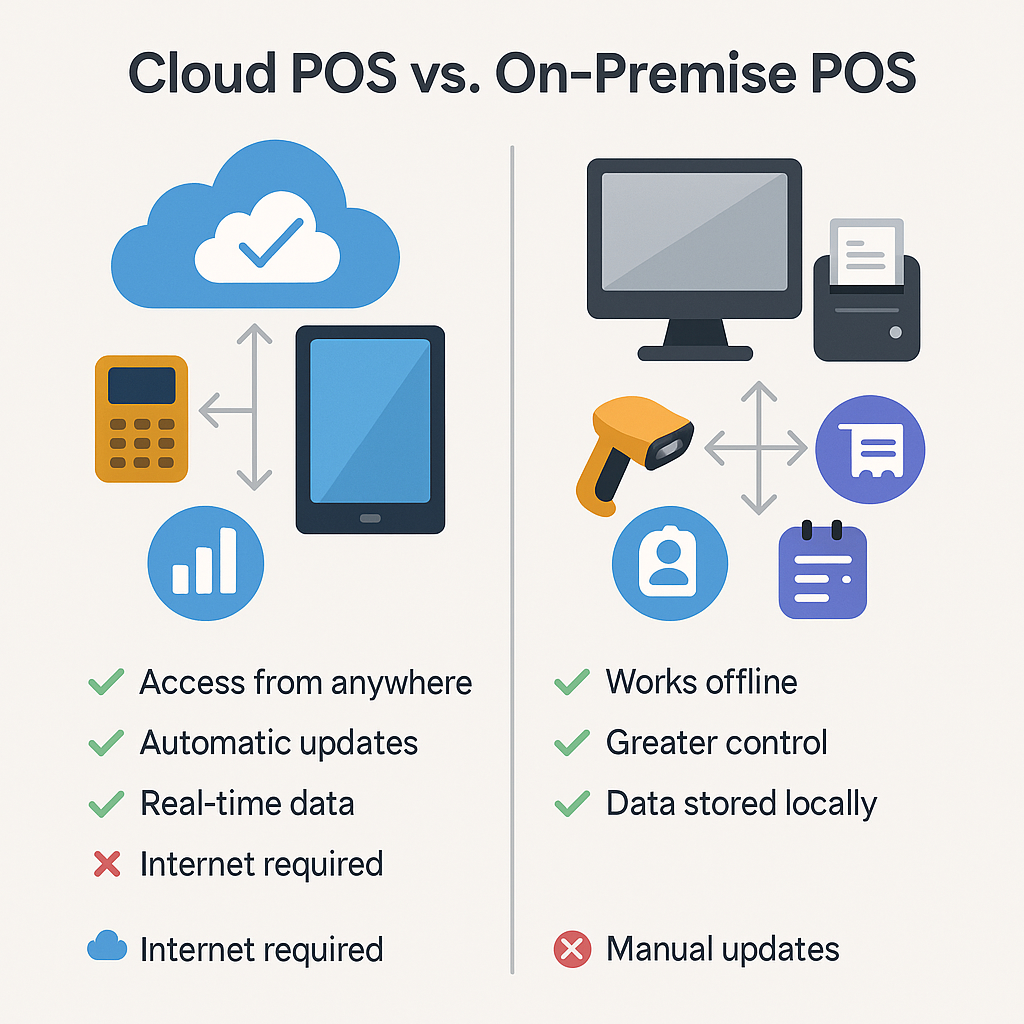
Self-Service Kiosk Systems
A digital interactive computer system that uses a touchscreen interface to allow customers to independently complete purchases like ordering food, checking in or paying bills. These systems increase efficiency, reduce labor costs by streamlining operations and enhance customer experience.
Omnichannel POS Systems
A retail solution connecting all backend operations and customer facing services to provide a unified shopping experience across different channels. These systems synchronize data from several sales channels including online, in-store and mobile in one place.
Multichannel POS Systems
A system managing sales, inventory and customer data across multiple sales channels including online stores, physical locations and mobile apps, treating each channel independently. These systems centralize operations to keep the data separate, allowing businesses to offer seamless and consistent customer experience.
Traditional POS Systems
often known as On-premise POS systems, are physical hardware systems, allowing businesses to set up their location. These systems include cash registers, desktop computers and servers that host the POS software locally.
Mainly in this system the data processing and storage are on the local databases, offering simplicity, reliability and stability for businesses to prioritize offline operations and immediate data access.
Read: Develop AI-Based Retail Web Analytics Software
Security and Data Protection in POS Retail Software
Implementing robust security measures and data protection protocols in POS software to safeguard sensitive data. This involves various security measures such as:
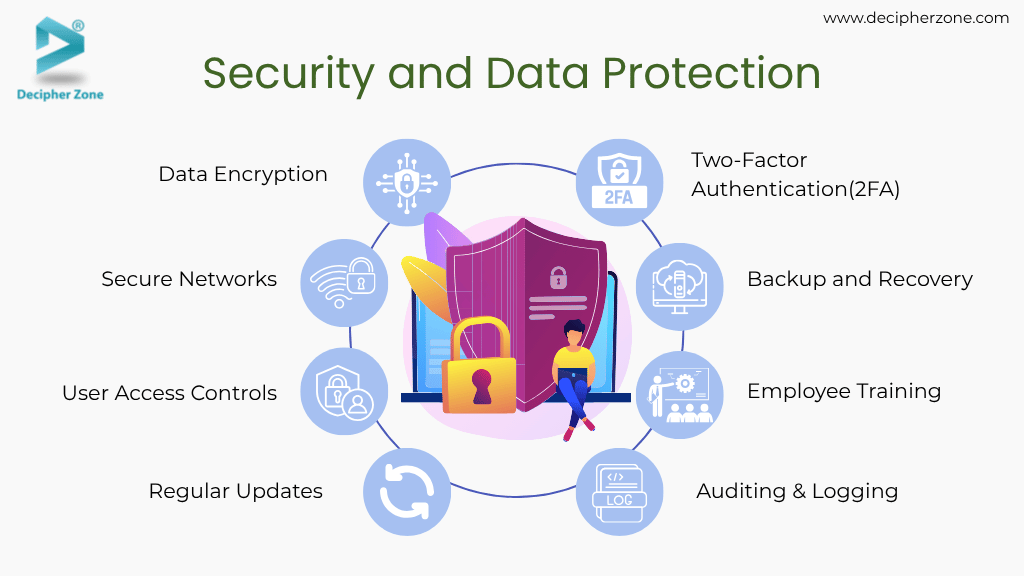
-
Data Encryption: All data transmitted should be encrypted to prevent unauthorized access and interception through the POS software.
-
Secure Networks: Avoid public Wi-Fi and should be connect to private, secure networks, utilise firewalls and VPNs to enhance protection.
-
User Access Controls: Limit access to sensitive data by granting access to the POS system based on employee roles and responsibilities.
-
Regular Updates: To patch vulnerabilities and address security flaws, update POS software and hardware regularly.
-
Two-Factor Authentication(2FA): For an extra layer of security beyond passwords implement multi-factor authentication.
-
Backup and Recovery: To ensure data recovery in case of a breach or system failure implement regular backup schedules and store backups securely.
-
Employee Training: To prevent data breaches from internal misuse, train employees on security protocols and best practices.
-
Auditing & Logging: Track access and identity potential security incidents by maintaining audit trails and logs of POS system activity.
Customization and Localization POS Software in GCC Markets
Customizing and localizing POS software for the GCC (Gulf Cooperation Council) region requires more than a one-size-fits-all solution. MENA regions be it UAE, Saudi Arabia, must tailor to meet local expectations in terms of user experience, language, compliance and security.
Here are key customization and localization strategies:
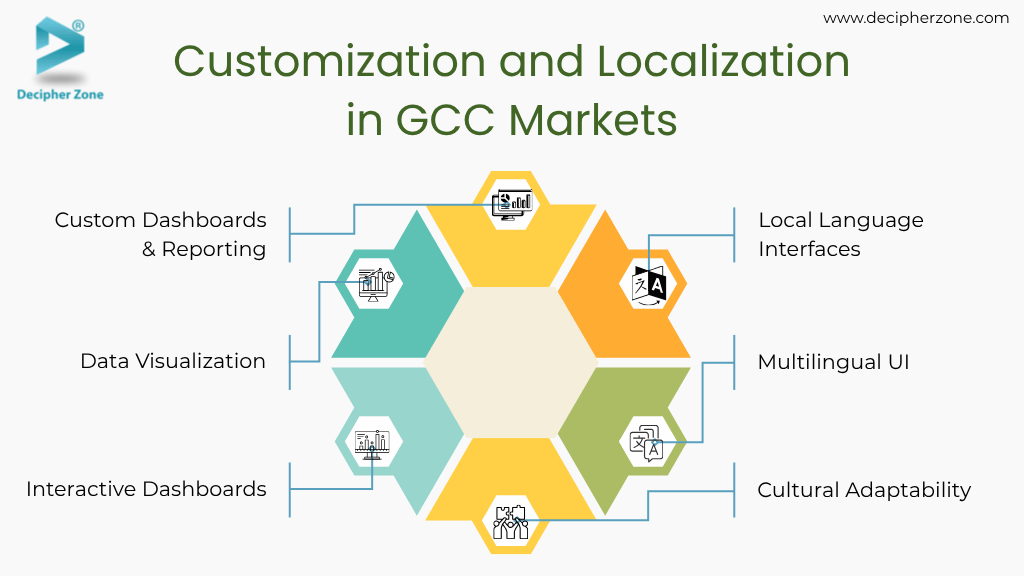
-
Custom Dashboards & Reporting: A hypermarket in Riyadh or a convenience store in Dubai? Create dashboards and reports tailored to business insights reflecting their unique KPIs, sales goals and operational priorities.
-
Data Visualization: With clear and actionable metrics transform complex data into visual charts and graphs to easily identify trends and spot issues to make well informed decisions in real-time.
-
Interactive Dashboards: Leverage dynamic dashboards that enable to filter, segment, exploring sales, inventory and customer data down to the product.

-
Local Language Interfaces: Offering both Arabic speaking staff and English speaking managers to expatriates with dual language interfaces for a better experience. Ensuring smooth operations across your team.
-
Multilingual UI: To reach a broader workforce allow employees to use POS systems in the language they are most comfortable with. This boosts efficiency and reduces training time.
-
Cultural Adaptability: Enhance user experience by not just localizing the language but also the tone and format including accommodating right to left navigation where appropriate, adjusting date and time formats and considering cultural preferences.
.avif)
-
Local Payment Gateways: Integrating region specific payment methods like Mada in Saudi Arabia, STC Pay, BenefitPay in Bahrain and more with solutions to ensure seamless transactions at checkout.
-
User Convenience: Providing local payment methods not only boosts trust but also increases the likelihood of completed purchases by aligning with customer habits.
-
Seamless Integration: Ensure faster checkout and financial sync with direct integration with local payment providers for real time transaction processing and reconciliation.
-
Legal & Regulatory Compliance: Adhere to VAT regulations, electronic invoicing mandates and digital security law to not just avoid penalties but build credibility with local authorities.
-
Robust Tech Infrastructure: The POS system should be optimized for the region’s infrastructure including quick, cloud-enabled and mainly for the high volume seasons like Eid or National Day sales.

By focusing on these key elements of customization and localization, businesses in the UAE, Saudi Arabia and other GCC countries can provide a user experience that not just feels native but compliant and customer centric.
Read: Cloud Kitchen Management Software Development
Cost of POS Software Implementation
If you’re a business thinking of implementing POS systems into your existing system, well you might need to think about it. Retail and Point-of-Sale systems costs can vary depending on features, scale, deployment method whether it’s on cloud or on-premises and support and maintenance requirements.
Here is a breakdown of the cost components you should consider before implementing:
-
Basic POS Setup: $4,000- $7,000
Basic POS systems include features like billing, inventory tracking and standard reporting which are ideal for small supermarkets or single outlet stores.
-
Mid-Range Implementation: $7,000- $18,000
This system offers multi-location support, advanced analytics, local payment gateway integration and CRM features which are best suited for growing businesses or regional chains.
-
Enterprise-Level POS System: $18,000- $35,000+
This system includes full-scale customization, BI dashboards, multi-language interfaces (Arabic/ English), compliance features and mobile POS capabilities which are basically designed for large supermarket chains with multiple branches.
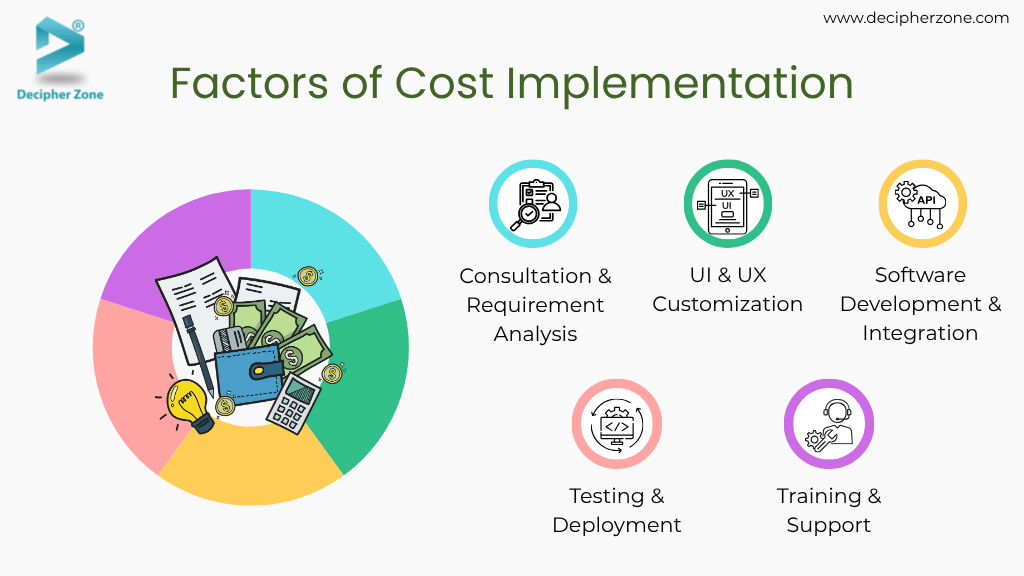
Our implementation cost includes:
-
Consultation & Requirement Analysis: Understanding and analysing your operational flow and suggesting the right fit-solution.
-
UI & UX Customization: Based on brand identity and workflow offering tailored interfaces.
-
Software Development & Integration: Integrating with your existing systems from ERP to loyalty programs and payment gateways.
-
Testing & Deployment: Offering end to end quality assurance and testing to ensure a seamless go live experience.
-
Training & Support: Providing hands-on training for your team and ongoing support.
Start Your Digital Retail Transformation — Request a Personalized POS Consultation
Choosing the Right POS Software Partner
The POS software development and implementation partner can define the efficiency, scalability and long term success of your retail business. According to the UAE and Saudi Arabia, you need more than just off-the-shelf software, a more reliable technology partner who understands your market, your target audience and your growth vision.
Why Decipher Zone is the Right Choice for Retail & POS Software Development?
Our team at DZ doesn’t just deliver software but builds tailored digital software solutions that transform the way you operate and engage with customers. Businesses across the GCC region trust us as their POS software development partner because:
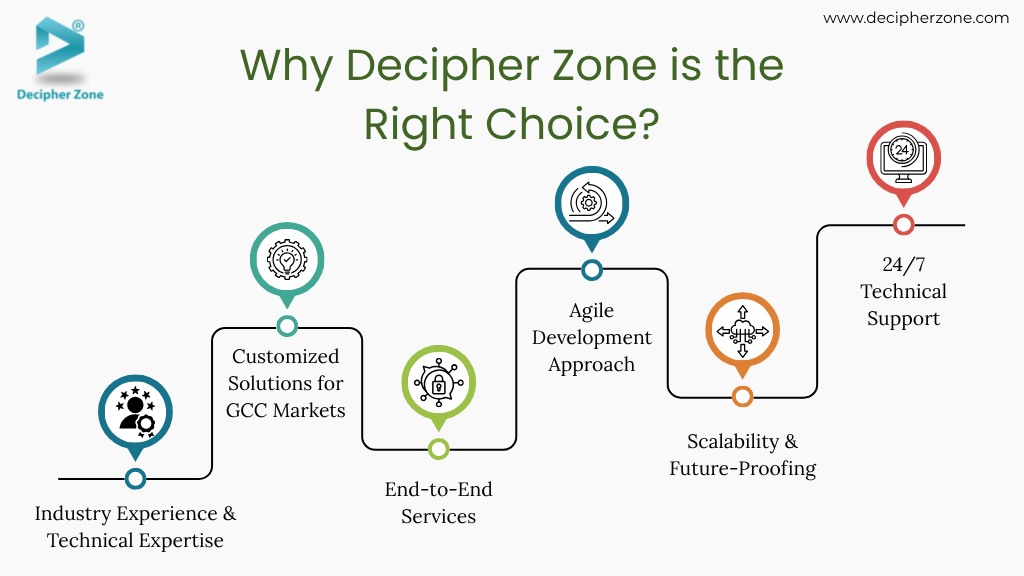
-
Industry Experience & Technical Expertise: With years of building custom systems in various industries, retail chains and franchise models, our team knows exactly what it takes to engineer reliable, scalable and secure solutions.
-
Customized Solutions for GCC Markets: We specialize in developing software solutions that are fully localized for the UAE and Saudi Arabia including bilingual interfaces, local payment gateways, etc.
-
End-to-End Services: We cover the full POS implementation journey from initial consultation to system architecture, deployment, training and ongoing support.
-
Agile Development Approach: We provide clarity and complete transparency by embracing agile methodology. This approach enables swift development cycles and ongoing improvements, ensuring that you're always in the loop and informed about our progress.
-
Scalability & Future-Proofing: With future-ready technologies including cloud-sync, mobile POS and real-time analytics, allows your business to grow whether you’re a single store operator or managing a network of retail outlets.
-
24/7 Technical Support: our team is available to provide you with round the clock technical support even during peak business hours to ensure your operations run smoothly without interruptions.
Partnering with Decipher Zone is like being committed to a technology ally. We help you turn everyday challenges into opportunities for growth, efficiency and exceptional customer service and build the future of your retail business together!
FAQs
-
How does Retail & POS software work?
Retail and Point-of-Sale (POS) software offers the entire sales process, from item scanning to payment processing and inventory management. This system act as a central hub for all transactions, allowing businesses to manage their operations efficiently.
-
Is POS software suitable for small businesses?
Yes, POS software provides tools that are well-suited for small businesses that offer efficient transactions, inventory management and data analysis. These systems can streamline operations, boost efficiency and enhance customer experiences, leading to growth and scalability.
-
What are the benefits of Retail & POS software?
Retail and Point-of-Sale (POS) software facilitates a wide range of advantages including Inventory Management, Employee Management, Automated Tasks, Sales Reporting & Analytics, Customer Insights, Upselling & Cross-selling, Centralized Multi-Store Management and Staff Management & Shift Scheduling.
-
Can I use my laptop as a POS system?
Yes, POS systems are flexible. Many businesses can use their laptop, desktops, mobile phones, or tablets as POS systems. These systems convert laptops into POS terminals, ideal for remote vendors or businesses needing on the go transactions, offering flexibility, convenience and cost effectiveness.
**Disclaimer: Some images used in this article have been generated with the assistance of AI.

